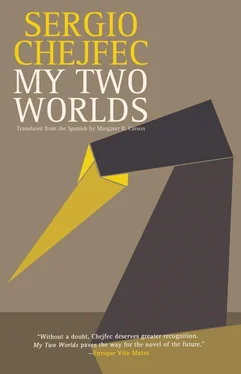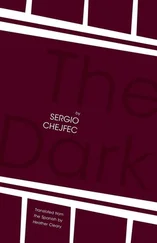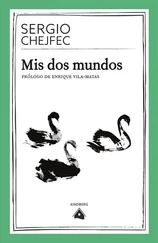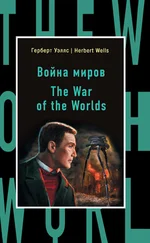These unreliable and of course unpredictable beings I see from time to time follow a regime that I’d describe as floating. They seem available, open to establishing contact, or at least within one’s reach, and capable of sensing our approach, but they float or are soft: when we draw near they move away, pushed by the ripples of air our movements create. They’re unstable, not so much in their fleetingness as in their haphazardness; seemingly dominated by forces beyond them, one moment they’re close, then far away the next, or suddenly gone. I don’t know whether they sink or rise, or whether they hover in place before passing through the next wall or acquiring another shape.
As I say, I can’t rule out the possibility that my impressions have been caused by weariness, built up over a long day of walking, but the ghosts have had a lasting, if indeed ephemeral, presence in what I more or less conventionally call my life, a presence that continues to this day and will no doubt extend into the future. Most often, I don’t need to see them to know they’re around, or at least to bear them in mind and notice their throbbing presence. They appear according to their own mysterious schedule and settle in an indefinite place for varying lengths of time. From my point of view, they’re witnesses, but from theirs, I imagine, they’re the protagonists. Still, I’ve never seen them depart from their script of passivity, nor am I certain that they’re contemplative. To my mind, they’re hollow, vacated characters, like wandering souls searching for a time or substance that can contain them. Apart from this, I lack Gothic proclivities: the ghosts who accompany me from time to time have never proposed anything, no one is channeling through them, and their productivity is zero. These same deficiencies predispose them to anything at all, as if they were always ready for any sublimation. In an ever-narrowing world with fewer and fewer embellishments, they too have thinned out, I believe.
Today they are fog and shadow, or the blurry speck of a furtive presence. Despite their apparent uselessness, the ghosts have served to rekindle my desire to wander. All too frequently, as I’ve said, I feel walking lacks a purpose, when I’m confused by my surroundings I forget the reason for my walk, but the ghosts rescue me, they wake me up because in their uncertain presence I’m transported elsewhere to a place, I’m not sure what to call it, where parallel events occur. Then the walk turns into an invented affair, which can unfold as a drama or comedy and, in that way, offer some lesson, though probably a diffuse one. This doesn’t always happen, only on the infrequent occasions that my thoughts begin to stray, and it lets me keep walking as I had planned.
I then thought about the apparition of the student. That had no hidden meaning for me, and as I said, the only feeling or aftertaste was one of irritation, first because of my uncertainty about its true condition and, second, because it had taken me by surprise. I took a few steps toward the heart of the circular garden; I felt like a lumbering giant, out-of-scale with the place. Though I needed only to lift my leg slightly to step over the hedges and shorten the way, I obediently kept to the paths. On the central allée I found the bench, looking more like a gravestone, where the ghost had been and, around it, traces of recent use that delighted my archaeological eye, at least that’s what I thought, though I couldn’t be sure. The earth disturbed near the bench, for instance, which suggested that the character had scuffed his feet against the ground while seated. I could easily imagine a ghost doing the same, I myself would have done so: a typical act in solitude, when one is sleeping in a park, or is feeling desperate, or when one hopes to attract the attention of someone in the future. And when this student had achieved that, he could leave; his intention was to give me something to think about. It was odd that I hadn’t seen him at first; and that now, when he was no longer there, I focused on these traces as if impelled to recreate his presence. It’s something a walker always does, though nothing seems certain. This afternoon I was facing no solemn or imposing landscape, nor was its physical layout transcendent; it was, as I said, a deserted garden, circular in shape, that if not for the bougainvilleas would have presented a decidedly dejected appearance.
I now realize that almost everything in this city has looked that way to me because of the pale, half-dejected light. Perhaps it’s the latitude, so far south. Several scenes and vistas reminded me of other cities located on southern rivers, I don’t know the best word for them. One can describe cities in many ways, but in their case I’d use the word “quiet.” Cities in repose, quiet cities where the waits are always long and must be endured by all. .
After leaving the labyrinth, or the flower garden, whatever it was, I went on further into the park. I headed down a straight path into which smaller paths converged every now and then. At some of these intersections there were small buildings, painted antique yellow and rounded in shape, resembling guardhouses or observation points, or indeed tiny astronomical observatories, each with its dome, its arched doorway and its narrow window that let in a small amount of light, designed in what appeared to be the Rationalist style. Their harmony of form caught my attention, as did the special care that was devoted, no doubt in the past, to such ancillary structures in what now seem out-of-the-way places.
On the opaque, corroded wall of one of these structures I saw a mark or legend that I couldn’t understand, in an unknown alphabet, neither sophisticated nor rudimentary. For a time I tried to decipher it, a single character at least, and as I did so I kept stepping backward and forward, or approaching the wall from different angles. Before giving up, I took a photo, which I’ve kept, that unintentionally included part of the window, which now, by a trick of photography, resembles an arrow pointing to the incomprehensible script. Someday, I thought, a future walker will be able to understand what the walker from the past left here; he or she will be able to know if it was a warning, an instruction or a private message. And the same applies to the photo I have before me, I think now. Though who can tell what the future holds for a photo that hides beneath its file name on the computer screen — minimized as they say — for the most part dormant. When I click on it, the image unfurls like an apparition, at once sudden and controlled, and seemingly always available, as is everything in my private archive. Nonetheless, its future is known, much as one might wish to ignore it: the photo will live briefly in somebody’s memory, and then become dormant once again — that is, in no one’s active memory — and after that it will hibernate in some electronic corner of the world for a long time before disappearing for good. In the other photo, which I took so as to capture the entire building from the ground up, you can make out, on the eave or cornice above the doorframe, several patches of peeling paint.
After taking the photo and resuming my walk, I soon came to a shady crossing where several paths converged. It seemed sunk in one of those silences that are supposedly constant yet are called deep, a silence that at first seems perpetual but in fact is made up of many noises. There, under the shade of several giant trees, you could forget the city, or if it came to mind, believe you were outside it, many kilometers away. I took a few tentative steps, fairly surprised by the peace and calm of the place, as if it had been especially designed to confuse, a possible trap, and discovered that the shadows were due not only to the stand of trees and the dense foliage, but also to enormous aviaries, that is, high-ceilinged cages with black-painted bars, which stood in groups of three or four on a wide stretch of the land. The section of the aviary was surrounded by a wire fence. You could see the cages through this fence, at any rate those of them that faced outward, and the birds in captivity were visible within, along with smaller birds who had entered to eat.
Читать дальше












